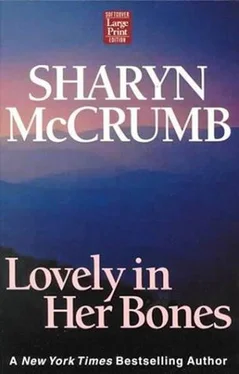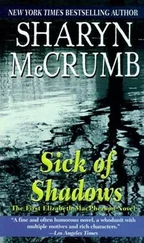“Yes, of course. It will be good experience for both of them. It will be the first time for Mary Clare.”
“That,” said Tessa, “I find very difficult to believe.”
It was well past five o’clock when Milo finished up in the lab and returned to his office. The light was still on and the door was open. Milo’s office mate, Mary Clare, was curled up in her swivel chair making notes on index cards.
“Don’t you ever go home?” asked Milo.
“Look who’s talking,” she answered without looking up.
“What are you doing? Lecture prep?”
“Yeah. Getting my facts straight. Somebody always asks me a question that requires an exact date or a statistic, and I can’t quote that stuff off the top of my head.”
“Neither can I, but Alex sure can. I think he’s got that discriminate function chart memorized. But don’t worry; I’m sure you’re a good teacher.”
“Good as I want to be,” said Mary Clare. “I don’t plan to be stuck on a campus all my life. I want to be a real anthropologist-out there doing fieldwork.”
“Well, you’re going to get a taste of it pretty soon. This time next week we’ll be roughing it in Sarvice Valley.”
Mary Clare’s jaw dropped. “We’re gonna be where?”
“Sarvice Valley. Don’t you know where that is? I figured you would. Mr. Stecoah talks just like you do.”
“I’ll bet he does!” snorted Mary Clare, momentarily distracted. “You and Alex couldn’t tell Loretta Lynn from Scarlett O’Hara! Where’s this guy from? Eastern Kentucky?”
“No. Sarvice Valley is in the area where North Carolina, Virginia and Tennessee all come together.”
“That’s closer than I expected,” said Mary Clare grudgingly. “But y’all still don’t know your accents. Now what’s this about a dig? I thought we were going to be doing local work this summer while Alex finished up the discriminate function chart.”
“So did I,” admitted Milo. “But all of a sudden he seems anxious to go. Maybe he’s just interested. The job is to authenticate an Indian tribe. Alex wants to meet with both of us in the morning, by the way. That’s why I wanted to talk to you first. Since you assisted him with the field archaeology course first session, we’ll probably get the diggers from that class.”
“Probably. What about it?”
“I was wondering: do you think we could use one more person?”
Mary Clare sighed. “If he’s moving us clear to the Tennessee line, I expect we’ll need all the help we can get. A lot of my people are signed up for classes this session and won’t be able to go.” Her eyes narrowed. “Why?”
Milo assumed his most unconcerned expression. “Oh, a friend of mine said she’d like to go on a dig sometime, that’s all.”
“Oh, Lord. Why don’t you take your girlfriends to dances like everybody else? Stop blushing, Milo! I didn’t say no. It’s all right with me, but you’ll have to put up with her. I don’t want any Christmas tree angels on this dig not wanting to get dirty, not wanting to get sunburned, not-”
“She’ll behave.” Milo grinned. “She’s not the delicate type. Did I tell you she brought a skull home last week?”
“This makes the third time, Milo. Look, go ahead and ask her to come along. Make sure she has a trowel and a sleeping bag-”
“I know, Mary Clare, I know.”
“And remember, if she turns out to be a prima donna, she’s your problem. I don’t know why anthropologists always get tangled up with women who become millstones around their necks, like-” She caught herself and looked quickly at Milo.
“I know,” said Milo quietly.
When Milo left the office, it was past six o’clock but still sunny. He cut across the upper quad, avoiding the parameters of an impromptu softball game, and took the path that led past the duck pond, sheep barns, and across the highway to Brookwood. His apartment was a fifteen-minute walk from campus, but he was in no hurry to get there. He lingered near the duck pond watching the campus waterfowl, fat from begging, glide across pools of sunlight. At the water’s edge a boy in a football jersey was throwing a Frisbee over the head of a frantic Labrador retriever. Milo sat down at a concrete picnic table to think.
Because he was a comfortable-looking fellow with a kind word for everyone, people tended to confide in Milo. Perhaps they meant to compliment him with their display of trust, but his uneasiness always outweighed his gratification. “If I wanted to hear personal problems, I’d have been a psychiatrist,” he told himself. “I’m a forensic anthropologist, for God’s sake! I don’t understand people who aren’t dead. ” He had not mentioned the paper he found in the hall to Mary Clare, because he sensed the makings of a disaster in it. He didn’t even want to think about it himself. His greatest fear was that Lerche, knowing that he’d seen it, would feel obliged to give him some sort of explanation. This, Milo felt, would be very awkward for everyone. He had done his best to play dumb when he’d returned the paper; he hoped his show of innocence had convinced Lerche that he knew nothing. Mary Clare had been about to tell him something back in the office, but he had managed to forestall that, too. If this dig was going to be the backdrop for a soap opera, Milo didn’t want to know the details.
Milo got up and started on the path toward the sheep barns. The sun was lower in the sky now, making the tin roofs glow red and turning the sheep into shadow pictures. He didn’t want to think about Lerche’s troubles any more. He wouldn’t blame the man for getting involved with Mary Clare, he decided. Anybody could see that Mrs. Lerche was the Junior League type, and probably a pain in the ass as a scientist’s wife, but all the same, Alex ought to be careful. Her idea of revenge might be to play the part of a woman scorned on the carpet in the dean’s office. He shook his head. Maybe Mary Clare was right; maybe he was crazy to be asking Elizabeth along on the dig, but at least he’d find out what type she was before they got too involved.
Having made this resolution, Milo spent the rest of the walk home planning the fine points of inviting Elizabeth. Should he make her buy her own trowel or give her one of his old ones?
When he reached the door to the apartment, his reverie had reached the stage of imaginary dialogue in which he said bright and clever things to which Elizabeth responded with dazed admiration. He was somewhat surprised to open the door and find that she was actually there.
“Hello, Elizabeth!” he stammered. “I’m glad you’re here.”
“You won’t be when you taste dinner,” Bill warned him.
Milo sat down on the couch beside his roommate thinking about the meals he would be having for the next few weeks in Sarvice Valley. “Maybe we could send out for a pizza.”
“Very funny,” said Elizabeth, who had returned to the kitchen. “Why are you glad I’m here?”
“Well, I have some interesting news. Can you leave that stuff and come in here?”
“That’s right. Distract her.” Bill lunged for the telephone book. “Pizza… pizza.”
Elizabeth adjusted the dial on the electric skillet and came back into the living room, making a dive for the phone book. Bill dodged the attack and called out Lombardi’s number to Milo.
Milo picked up the phone, and then, remembering his manners, told Elizabeth: “I have a good excuse for this. I’m going to have to be eating garbage for the next couple of weeks, so I can’t afford to waste any meals right now.”
“Very diplomatic,” Bill commented.
Elizabeth glared at him. “Do as you please.” She had intended to make this her exit line, but as she turned to leave, the implication of Milo’s explanation struck her. “What do you mean you’ll be eating garbage for a couple of weeks?”
Читать дальше












